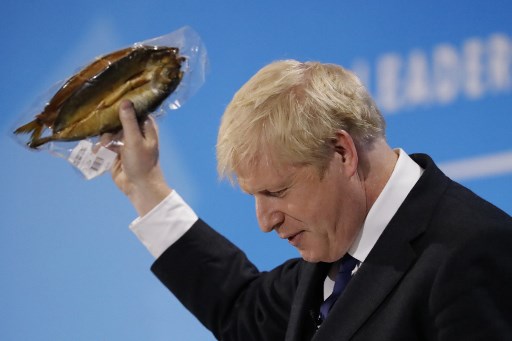
Unite the right
As Braverman calls for her colleagues to embrace Farage, it could be argued that they’ve already been there, done that, bought the t-shirt, writes Bremain Chair Sue Wilson MBE for Yorkshire Bylines.
Across Europe, far-right groups are celebrating minor gains in the EU elections. While not living up to earlier expectations or hype, the result will see an increase in far-right MEPs in Brussels, but only by nine seats. Pro-European centre parties have claimed the victory and will form the majority in the European Parliament. The election results are, however, causing some upheaval – most notably in Belgium and France – with the resignation of Belgian PM De Croo, and with French President Macron calling a snap election.
Here at home, desperate Conservatives have long been witnessing the rise of the far-right both inside and outside their own party. Despite being largely responsible for that shift to the far-right, Conservatives can now only stand back and watch Reform UK steal much of their thunder, while their own leader looks increasingly hopeless, hapless and helpless.
Today’s Times.
The Conservative Party is now rapidly circling the plug hole of Farage. They should never have swum so close.
Better for the One Nation Tories to fight back to the middle ground where their party has a future than, like Braverman, acquiesce to this fate. pic.twitter.com/zrepuv699a
— Mike Galsworthy (@mikegalsworthy) June 10, 2024
Unite the right
While more centrist Conservatives – if there are any left – lose hope for the soul of their party, one of their most extreme members – former Home Secretary and Attorney General Suella Braverman – has other ideas. Staunch Brexiter Braverman is urging her party to “embrace” Reform UK leader, Nigel Farage, saying she would welcome him into the party.
Braverman has argued that “there’s not much difference” between the policies of Farage and the Conservatives, as she called on her party to “unite the right”. This follows recent speculation that Farage could join the Conservative Party after the forthcoming election, potentially as leader – an idea supported by several senior party members, including Braverman, Liz Truss and Priti Patel.
Tory insiders fear Farage takeover after election wipeout
Seems inevitable after the futile Tory lurch to the far-right to try to stave off Farage
Let’s just hope it all becomes irrelevant after that predicted wipeout!#GTTO https://t.co/xUDOjok0zJ
— Dr Tim Kinsella #FBPA #FBPE (@51TJK) June 9, 2024
Braverman’s comments follow a recent poll – conducted by the Independent newspaper – that suggested Farage was the most popular option to succeed Rishi Sunak as the leader, with 19% of votes cast. Hardly an overwhelming endorsement considering 48% of those polled said “don’t know” when asked who should be the next leader. Braverman herself received just 4% of the vote, coming in fifth, from a list of seven possible candidates.
When asked recently if he was proposing a merger between the Conservatives and Reform UK, Farage replied that it would be “more like a takeover”. First, though, there is the small matter of him winning a seat at Westminster after seven failed attempts.
UK election projection
Despite the rise in popularity of the far-right, the UK’s first-past-the-post voting system means Reform UK are unlikely to convert support into seats in Westminster. The latest YouGov poll shows a landslide result for Labour, with a projected 422 seats (a “historic majority of 194”), just 140 seats for the Conservatives, and no seats at all for Reform UK. For context, when Tony Blair won a landslide victory in 1997, Labour won 418 seats – the most ever – with a majority of 179.
YouGov’s director of political analysis, Patrick English, said the recent intervention of Farage as leader of the party “significantly increases the odds of Reform UK winning one, perhaps two seats at Westminster”. Farage’s return would also “improve Reform’s prospects” and, English added, their best hopes of success would come in constituencies where they were fielding ‘heavy hitters’. The three most likely constituencies to return a Reform UK candidate would be Clacton (where Farage himself is standing), Ashfield (Conservative defector, Lee Anderson) and Boston and Skegness (Richard Tice). The latest betting trends published by Oddschecker would seem to support English’s assertions
The Brexit effect
Brexiters Braverman, Anderson and Farage are all peas from the same populist, anti-immigration pod. When Anderson announced his defection from the Conservatives to Reform earlier this year, no one would have been surprised had Braverman followed suit. With Farage now keen to take over the Conservative Party, they could all end up in the same party. Assuming, of course, that any of them actually win enough support to be returned as MPs on 4 July.
As Braverman calls for her colleagues to embrace Farage, it could be argued that they’ve already been there, done that, bought the t-shirt. Farage’s influence, whether at the time of the Brexit referendum, or during the 2019 election, has brought the country, and the Conservatives, to where we are now – on the verge of a Labour landslide and with public trust in government completely eroded.
#EUelections
Had Britain still been in the EU, under current polls, Labour would have won enough seats to make the Socialists & Democrats the largest political Group in the European Parliament (and Labour the largest party within it)— Richard Corbett (@RichardGCorbett) June 9, 2024
With few centrist voices left within what remains of the Conservative Party, their swing to the right, and their terrible legacy of failure, incompetence and waste, will surely bring about their electoral downfall. Perhaps even their total destruction. While the party was busy focussing on the loss of votes to Reform, they were blindsided by Labour’s resurgence, and a British public who have had quite enough.
What will happen to the Conservatives and Reform once our own election is over, remains to be seen. While they both skulk away to lick their wounds, the country will be switching its focus to the incoming Labour government. We’ll have questions. A lot of them. And many of them will focus on Brexit, whether they like it or not.
EU moves to the right
As for the European Union, it’s worth remembering that these were the first EU elections that excluded the UK electorate from voting. Not only that, but had we still been EU members, Labour would have – according to former Labour MEP Richard Corbett – “won enough seats to make the Socialists and Democrats the largest political group in the European Parliament”.
Brexit was supposed to be about “taking back control”. In reality, we lost control to far-right-extremists, losing our voice, our influence and our standing. At a time when we should be stood shoulder to shoulder with our allies, friends and neighbours, we’ve been isolated and adrift.
Being left alone to fight the battle against far-right extremism is a risk for the UK. As for Europe, the battle for the centre ground could be assuaged were London to stand beside Brussels. Perhaps, in this fight, the EU really does need us as much as we need them.
As for the next EU elections in 2029, will the UK have a vote? That may be a tall order. But don’t rule it out. A week, and five years, are a long time in politics.


















